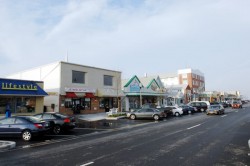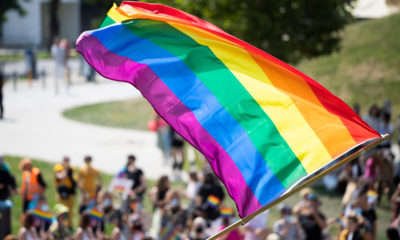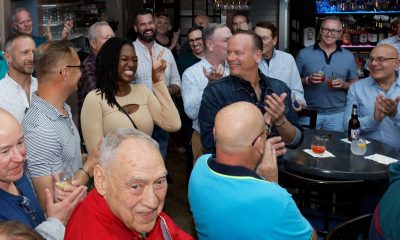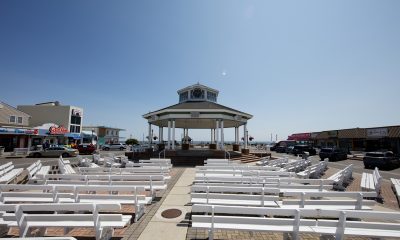Local
Rehoboth officials accused of ‘hassling’ businesses
Code enforcement officer creates stir over visit to Aqua Grill
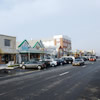
A code enforcement officer in Rehoboth Beach, Del., became the target of a radio talk show host last weekend after the officer told the gay bar and restaurant Aqua Grill that it violated a local ordinance for flying a flag two inches too low over the sidewalk next to its entrance.
The civilian enforcement officer informed Aqua’s manager of the code violation on May 13 after determining that a flag with the inscription “Open – Welcome to Beautiful Baltimore Avenue” dipped below an 80-inch minimum height restriction for flags extending into public spaces, according to Aqua Grill co-owner Joe Maggio.
“He said we were being cited and we would receive a letter in the mail,” said Maggio, who told the Blade he couldn’t confirm over the weekend whether the bar would be fined for the height violation.
“He could have come in and said, ‘hey, it needs to be raised two inches.’ And we would have been happy to pull out a drill and move it,” said Maggio.
The popular bar and restaurant decided instead to have someone shear off the bottom of the flag with a pair of scissors to comply with the height restriction, Maggio said.
A city official said on Monday said Aqua Grill wasn’t fined and that the enforcement officer only issued a warning, saying the city would give the establishment time to correct the infraction.
But news of the enforcement action created a stir when an Aqua Grill customer present during the visit by the enforcement officer posted an account of the incident on Facebook.
Sussex County radio host Dan Gaffney joined gay supportive Delaware State Rep. Pete Schwartzkopf (D-Rehoboth Beach) and other Aqua Grill customers in criticizing the city for appearing to be hurting local businesses through unnecessary regulations.
“This is stupid beyond belief,” Schwartzkopf wrote on Facebook. “In this economy, they are hassling businesses? I thought it might’ve been the American flag but we are talking about an ‘Open’ sign!”
Rehoboth Beach City Manager Gregory Ferrese said on Monday that the code enforcement officer has found violations of the height restriction for flags in 29 businesses so far this year. He said no specific type of business was being singled out in the enforcement action and that all businesses contacted so far have been given warning notices rather than a fine.
Ferrese and the city’s public works director, Mel Craig, who is gay, told the Blade that enforcement of the height regulation for flags hanging over public spaces like sidewalks was prompted by complaints from the public.
“I’ve gotten hit in the face by flags on a windy day when I walk down the sidewalk,” Craig said.
“If a kid gets hit in the eye with a flag, that’s a big deal,” said Ferrese.
According to Ferrese, city regulatory officials determined that the city is required to enforce the flag height restriction in order to comply with the Americans with Disabilities Act, or ADA, a federal law. The law, among other things, requires cities and towns to make sure the “path of travel” along public spaces such as sidewalks doesn’t include a potential obstruction for people with disabilities, including blind people.
An ADA official with the U.S. Justice Department in Washington, which enforces the statute, said the law and the regulations implementing it make no specific mention of flags, only that local jurisdictions should ensure that sidewalks and other public spaces don’t create a hazard for disabled people.
Jacques LeClair, owner of Rehoboth’s Proud Book Store, said he was among the first businesses approached by code enforcement officer Bobby Edmonds about flying his own flag below the height restriction.
“He was very polite. I got a letter from his office saying I was in violation,” LeClair said. “They gave me a period of time to correct it. I corrected it.”
LeClair added, “It’s not that they are picking on any one person or business. They are picking on everyone.”
Chris Beagle, a Rehoboth real estate agent and Aqua Grill customer, said the flag enforcement visit at Aqua raised concern within the local LGBT community because of its timing. He noted that it came on the first day Aqua opened for business for the 2011 beach season.
Beagle noted it also came eight months after Aqua’s other owner, Bill Shields, was mistakenly arrested and finger printed for allegedly violating another ordinance that prohibits restaurants and bars from allowing customers to stay on outdoor patios after 11 p.m.
Police raided 12 establishments for the patio violation during a crackdown last year that took place mostly over Labor Day weekend. Authorities now admit that Aqua was among just two or three of the establishments that were incorrectly targeted for the crackdown.
Shields said a Rehoboth Beach police officer who arrested him refused to listen to his attempt to explain that Aqua and other establishments that were in business before the patio ordinance was enacted are exempt from the ordinance through a grandfather clause.
Rehoboth’s police chief later acknowledged that the officer made a mistake by arresting Shields, saying the officer wasn’t aware that Aqua was exempt from the ordinance. Police later dropped the charge, but Shields said authorities have yet to follow through with a promise to expunge his arrest record.
With that as a backdrop, Beagle said the code enforcement visit to Aqua over the flag issue last weekend was “really bad timing” and a development that could give the impression to the LGBT community that a gay business is being targeted.
“It was very disheartening to see this happen on opening night,” said Beagle, who was present at the bar and saw Edmonds arrive wearing a jacket with the inscription “Code Enforcement.”
Maggio said he and other business owners and longtime residents of Rehoboth, both gay and straight, are “fed up” with what they view as an anti-business attitude in a city whose economy is dependent on small businesses.
He said he and others dissatisfied over the city’s regulatory policies are supporting gay businessman Thomas McGlone, an investment adviser, who is running against longtime Rehoboth Mayor Samuel Cooper in the city’s Aug. 13 mayoral election.
Cooper disputes claims that he is anti-business. He has said he supports local laws and regulations that prevent bars and other entertainment establishments from spoiling Rehoboth’s status and tradition as a family-oriented vacation destination.
Two of the city’s six elected commissioners, Dennis Barbour, who is gay, and Pat Coluzzi, who is lesbian, say they favor a balance between regulations needed to prevent disruptive businesses and assurances that businesses aren’t hurt by overregulation.
The two have spoken out against the patio crackdown last year and called for regulatory changes.
District of Columbia
Catching up with the asexuals and aromantics of D.C.
Exploring identity and finding community

There was enough commotion in the sky at the Blossom Kite Festival that bees might have been pollinating the Washington Monument. I despaired of quickly finding the Asexuals and Aromantics of the Mid-Atlantic—I couldn’t make out a single asexual flag among the kites up above. I thought to myself that if it had been the Homosexuals of the Mid-Atlantic I would’ve had my gaydar to rely on. Was there even such a thing as ace-dar?
As it turned out, the asexual kite the group had meant to fly was a little too pesky to pilot. “Have you ever used a stunt kite?” Bonnie, the event organizer asked me. “I bought one. It looked really cool. But I can’t make it work.” She sighed. “I can’t get the thing six feet off the ground.” The group hardly seemed to care. There was caramel popcorn and cookies, board games and head massages, a game of charades with more than its fair share of Pokémon. The kites up above might as well have been a coincidental sideshow. Nearly two dozen folks filtered in and out of the picnic throughout the course of the day.
But I counted myself lucky that Bonnie picked me out of the crowd. If there’s such a thing as ace-dar, it eludes asexuals too. The online forum for all matters asexual, AVEN, or the Asexual Visibility and Education Network, is filled with laments: “I don’t think it’s possible.” “Dude, I wish I had an ace-dar.” “If it exists, I don’t have it.” “I think this is just like a broken clock is right twice a day type thing.” What seems to be a more common experience is meeting someone you just click with—only to find out later that they’re asexual. A few of the folks I met described how close childhood friends of theirs likewise came out in adulthood, a phenomenon that will be familiar to many queer people. But it is all the more astounding for asexuals to find each other this way, given that asexual people constitute 1.7% of sexual minorities in America, and so merely .1% of the population at large.
To help other asexuals identify you out in the world, some folks wear a black ring on their middle finger, much as an earring on the right ear used to signify homosexuality in a less welcoming era. The only problem? The swinger community—with its definite non-asexuality—has also adopted the signal. “It’s still a thing,” said Emily Karp. “So some people wear their ace rings just to the ace meet-ups.” Karp has been the primary coordinator for the Asexuals and Aromantics of the Mid-Atlantic (AAMA) since 2021, and a member of the meet-up for a decade. She clicked with the group immediately. After showing up for a Fourth of July potluck in the mid-afternoon, she ended up staying past midnight. “We played Cards against Humanity, which was a very, very fun thing to do. It’s funny in a way that’s different than if we were playing with people that weren’t ace. Some of the cards are implying, like, the person would be motivated by sex in a way that’s absurd, because we know they aren’t.”
Where so many social organizations withered during the pandemic, the AAMA flourished. Today, it boasts almost 2,000 members on meetup.com. Karp hypothesized that all the social isolation gave people copious time to reflect on themselves, and that the ease of meeting up online made it convenient as a way for people to explore their sexual identity and find community. Online events continue to make up about a third of the group’s meet-ups. The format allows people to participate who live farther out from D.C. And it allows people to participate at their preferred level of comfort: while many people participate much as they would at an in-person event, some prefer to watch anonymously, video feed off. Others prefer to participate in the chat box, though not in spoken conversation.
A recent online event was organized for a discussion of Rhaina Cohen’s book, “The Other Significant Others,” published in February. Cohen’s book discusses friendship as an alternative model for “significant others,” apart from the romantic model that is presupposed to be both the center and goal of people’s lives. The AAMA group received the book with enthusiasm. “It literally re-wired my brain,” as one person put it. People discussed the importance of friendship to their lives, and their difficulties in a world that de-prioritized friendship. “I can break up with a friend over text, and we don’t owe each other a conversation,” one said. But there was some disagreement when it came to the book’s discussion of romantic relationships. “It relegates ace relationships to the ‘friend’ or ‘platonic’ category, to the normie-reader,” one person wrote in the chat. “Our whole ace point is that we can have equivalent life relationships to allo people, simply without sex.” (“Allo” is shorthand for allosexual or alloromantic, people who do experience sexual or romantic attraction.)
The folks of the AAMA do not share a consensus on the importance of romantic relationships to their lives. Some asexuals identify as aromantic, some don’t. And some aromantics don’t identify as asexual, either. The “Aromantic” in the title of the group is a relatively recent addition. In 2017, the group underwent a number of big changes. The group was marching for the first time in D.C. Pride, participating in the LGBTQ Creating Change conference, and developing a separate advocacy and activism arm. Moreover, the group had become large enough that discussions were opened up into forming separate chapters for D.C., Central Virginia, and Baltimore. During those discussions, the group leadership realized that aromantic people who also identified as allosexual didn’t really have a space to call their own. “We were thinking it would be good to probably change the name of the Meetup group,” Emily said. “But we were not 100% sure. Because [there were] like 1,000 people in the group, and they’re all aces, and it’s like, ‘Do you really want to add a non-ace person?’” The group leadership decided to err on the side of inclusion. “You know, being less gatekeep-y was better. It gave them a place to go — because there was nowhere else to go.”
The DC LGBT Center now sponsors a support group for both asexuals and aromantics, but it was formed just a short while ago, in 2022. The founder of the group originally sought out the center’s bisexual support group, since they didn’t have any resources for ace folks. “The organizer said, you know what, why don’t we just start an ace/aro group? Like, why don’t we just do it?” He laughed. “I was impressed with the turnout, the first call. It’s almost like we tapped into, like, a dam. You poke a hole in the dam, and the water just rushes out.” The group has a great deal of overlap with the AAMA, but it is often a person’s first point of contact with the asexual and aromantic community in D.C., especially since the group focuses on exploring what it means to be asexual. Someone new shows up at almost every meeting. “And I’m so grateful that I did,” one member said. “I kind of showed up and just trauma dumped, and everyone was really supportive.”
Since the ace and aro community is so small, even within the broader queer community, ace and aro folks often go unrecognized. To the chagrin of many, the White House will write up fact sheets about the LGBTQI+ community, which is odd, given that when the “I” is added to the acronym, the “A” is usually added too. OKCupid has 22 genders and 12 orientations on its dating website, but “aromantic” is not one of them — presumably because aromantic people don’t want anything out of dating. And since asexuality and aromanticism are defined by the absence of things, it can seem to others like ace and aro people are ‘missing something.’ One member of the LGBT center support group had an interesting response. “The space is filled by… whatever else!” they said. “We’re not doing a relationship ‘without that thing.’ We’re doing a full scale relationship — as it makes sense to us.”
CJ Higgins is a postdoctoral fellow with the Alexander Grass Humanities Institute at Johns Hopkins University.
District of Columbia
Bowser budget proposal calls for $5.25 million for 2025 World Pride
AIDS office among agencies facing cuts due to revenue shortfall

D.C. Mayor Muriel Bowser’s proposed fiscal year 2025 budget includes a request for $5.25 million in funding to support the June 2025 World Pride celebration, which D.C. will host, and which is expected to bring three million or more visitors to the city.
The mayor’s proposed budget, which she presented to the D.C. Council for approval earlier this month, also calls for a 7.6 percent increase in funding for the Mayor’s Office of LGBTQ Affairs, which amounts to an increase of $132,000 and would bring the office’s total funding to $1.7 million. The office, among other things, provides grants to local organizations that provide services to the LGBTQ community.
Among the other LGBTQ-related funding requests in the mayor’s proposed budget is a call to continue the annual funding of $600,000 to provide workforce development services for transgender and gender non-conforming city residents “experiencing homelessness and housing instability.” The budget proposal also calls for a separate allocation of $600,000 in new funding to support a new Advanced Technical Center at the Whitman-Walker Health’s Max Robinson Center in Ward 8.
Among the city agencies facing funding cuts under the mayor’s proposed budget is the HIV/AIDS, Hepatitis, Sexually Transmitted Disease, and Tuberculosis Administration, known as HAHSTA, which is an arm of the D.C. Department of Health. LGBTQ and AIDS activists have said HAHSTA plays an important role in the city’s HIV prevention and support services. Observers familiar with the agency have said it recently lost federal funding, which the city would have to decide whether to replace.
“We weren’t able to cover the loss of federal funds for HAHSTA with local funds,” Japer Bowles, director of the Mayor’s Office of LGBTQ Affairs, told the Washington Blade. “But we are working with partners to identify resources to fill those funding gaps,” Bowles said.
The total proposed budget of $21 billion that Bowser submitted to the D.C. Council includes about $500 million in proposed cuts in various city programs that the mayor said was needed to offset a projected $700 million loss in revenue due, among other things, to an end in pandemic era federal funding and commercial office vacancies also brought about by the post pandemic commercial property and office changes.
Bowser’s budget proposal also includes some tax increases limited to sales and business-related taxes, including an additional fee on hotel bookings to offset the expected revenue losses. The mayor said she chose not to propose an increase in income tax or property taxes.
Earlier this year, the D.C. LGBTQ+ Budget Coalition, which consists of several local LGBTQ advocacy organizations, submitted its own fiscal year 2025 budget proposal to both Bowser and the D.C. Council. In a 14-page letter the coalition outlined in detail a wide range of funding proposals, including housing support for LGBTQ youth and LGBTQ seniors; support for LGBTQ youth homeless services; workforce and employment services for transgender and gender non-conforming residents; and harm reduction centers to address the rise in drug overdose deaths.
Another one of the coalition’s proposals is $1.5 million in city funding for the completion of the D.C. Center for the LGBTQ Community’s new building, a former warehouse building in the city’s Shaw neighborhood that is undergoing a build out and renovation to accommodate the LGBTQ Center’s plans to move in later this year. The coalition’s budget proposal also calls for an additional $300,000 in “recurring” city funding for the LGBTQ Center in subsequent years “to support ongoing operational costs and programmatic initiatives.”
Bowles noted that Bowser authorized and approved a $1 million grant for the LGBTQ Center’s new building last year but was unable to provide additional funding requested by the budget coalition for the LGBTQ Center for fiscal year 2025.
“We’re still in this with them,” Bowles said. “We’re still looking and working with them to identify funding.”
The total amount of funding that the LGBTQ+ Budget Coalition listed in its letter to the mayor and Council associated with its requests for specific LGBTQ programs comes to $43.1 million.
Heidi Ellis, who serves as coordinator of the coalition, said the coalition succeeded in getting some of its proposals included in the mayor’s budget but couldn’t immediately provide specific amounts.
“There are a couple of areas I would argue we had wins,” Ellis told the Blade. “We were able to maintain funding across different housing services, specifically around youth services that affect folks like SMYAL and Wanda Alston.” She was referring to the LGBTQ youth services group SMYAL and the LGBTQ organization Wanda Alston Foundation, which provides housing for homeless LGBTQ youth.
“We were also able to secure funding for the transgender, gender non-conforming workforce program,” she said. “We also had funding for migrant services that we’ve been advocating for and some wins on language access,” said Ellis, referring to programs assisting LGBTQ people and others who are immigrants and aren’t fluent in speaking English.
Ellis said that although the coalition’s letter sent to the mayor and Council had funding proposals that totaled $43.1 million, she said the coalition used those numbers as examples for programs and policies that it believes would be highly beneficial to those in the LGBTQ community in need.
“I would say to distill it down to just we ask for $43 million or whatever, that’s not an accurate picture of what we’re asking for,” she said. “We’re asking for major investments around a few areas – housing, healthcare, language access. And for capital investments to make sure the D.C. Center can open,” she said. “It’s not like a narrative about the dollar amounts. It’s more like where we’re trying to go.”
The Blade couldn’t’ immediately determine how much of the coalition’s funding proposals are included in the Bowser budget. The mayor’s press secretary, Daniel Gleick, told the Blade in an email that those funding levels may not have been determined by city agencies.
“As for specific funding levels for programs that may impact the LGBTQ community, such as individual health programs through the Department of Health, it is too soon in the budget process to determine potential adjustments on individual programs run though city agencies,” Gleick said.
But Bowles said several of the programs funded in the mayor’s budget proposal that are not LGBTQ specific will be supportive of LGBTQ programs. Among them, he said, is the budget’s proposal for an increase of $350,000 in funding for senior villages operated by local nonprofit organizations that help support seniors. Asked if that type of program could help LGBTQ seniors, Bowles said, “Absolutely – that’s definitely a vehicle for LGBTQ senior services.”
He said among the programs the increased funding for the mayor’s LGBTQ Affairs office will support is its ongoing cultural competency training for D.C. government employees. He said he and other office staff members conduct the trainings about LGBTQ-related issues at city departments and agencies.
Bowser herself suggested during an April 19 press conference that local businesses, including LGBTQ businesses and organizations, could benefit from a newly launched city “Pop-Up Permit Program” that greatly shortens the time it takes to open a business in vacant storefront buildings in the downtown area.
Bowser and Nina Albert, D.C. Deputy Mayor for Planning and Economic Development, suggested the new expedited city program for approving permits to open shops and small businesses in vacant storefront spaces could come into play next year when D.C. hosts World Pride, one of the word’s largest LGBTQ events.
“While we know that all special events are important, there is an especially big one coming to Washington, D.C. next year,” Bowser said at the press conference. “And to that point, we proposed a $5.25 million investment to support World Pride 2025,” she said, adding, “It’s going to be pretty great. And so, we’re already thinking about how we can include D.C. entrepreneurs, how we’re going to include artists, how we’re going to celebrate across all eight wards of our city as well,” she said.
Among those attending the press conference were officials of D.C.’s Capital Pride Alliance, which will play a lead role in organizing World Pride 2025 events.
Maryland
Health care for Marylanders with HIV is facing huge cuts this summer
Providers poised to lose three-quarters of funding

BY MEREDITH COHN | By the end of June, health care providers in Maryland will lose nearly three-quarters of the funding they use to find and treat thousands of people with HIV.
Advocates and providers say they had been warned there would be less money by the Maryland Department of Health, but were stunned at the size of the drop — from about $17.9 million this fiscal year to $5.3 million the next. The deep cuts are less than three months away.
The rest of this article can be read on the Baltimore Banner’s website.
-

 State Department2 days ago
State Department2 days agoState Department releases annual human rights report
-

 Maryland4 days ago
Maryland4 days agoJoe Vogel campaign holds ‘Big Gay Canvass Kickoff’
-

 Politics3 days ago
Politics3 days agoSmithsonian staff concerned about future of LGBTQ programming amid GOP scrutiny
-

 The White House1 day ago
The White House1 day agoWhite House debuts action plan targeting pollutants in drinking water

